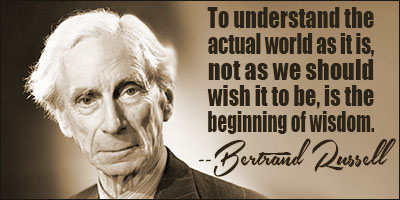I for a long time accepted the argument of the First Cause, until one day at the age of eighteen I read _____'s Autobiography, and I there found this sentence: "My father taught me that the question 'Who made me?' cannot be answered, since it immediately suggests the further question `Who made god?'" That very simple sentence showed me, as I still think, the fallacy in the argument of the First Cause. If everything must have a cause, then God must have a cause. If there can be anything without a cause, it may just as well be the world as God, so that there cannot be any validity in that argument. It is exactly of the same nature as the Hindu's view, that the world rested upon an elephant and the elephant rested upon a tortoise; and when they said, "How about the tortoise?" the Indian said, "Suppose we change the subject." The argument is really no better than that. Why I Am Not a Christian

2. The idea of a barber who shaves all who don't shave themselves is a logical ______, a seeming contradiction that is both true and false. Another example of the same thing would be a statement like "This sentence is ___." LH 186
3. A.J. Ayer's ______ Principle, stated in his 1936 book Language, Truth and Logic, was part of the movement known as _____ ______. LH 190
4. Jean-Paul Sartre's philosophy of freedom and personal responsibility, which denied that humans possess a common essence, was called ________. LH 200
What did Sartre mean by "freedom"? Inquiring minds want to know how any of us can be really free, when we still have payments to make on the fridge. Well, that's the crux of Sartre's "Roads to Freedom." Isn't it, Mrs. P? -"We'll ask him."
"What was Jean-Paul like?"
-"He didn't join in the fun much. Just sat there thinking..."
5. When Simone de Beauvoir said women are not born that way, she meant that they tend to accept what? LH 200
- “Man is defined as a human being and a woman as a female — whenever she behaves as a human being she is said to imitate the male.”
- “Fathers never have exactly the daughters they want because they invent a notion a them that the daughters have to conform to.”
- “Why one man rather than another? It was odd. You find yourself involved with a fellow for life just because he was the one that you met when you were nineteen.”
- “Self-consciousness is not knowledge but a story one tells about oneself.”
6. Which Greek myth did Albert Camus use to illustrate human absurdity, as he saw it? LH 200

- “You will never be happy if you continue to search for what happiness consists of. You will never live if you are looking for the meaning of life.”
- “There are causes worth dying for, but none worth killing for.”
- “I do not believe in God and I am not an atheist.”
- “Always go too far, because that’s where you’ll find the truth.”
- “Real generosity toward the future lies in giving all to the present.”
Albert Camus gave us the Existential version of Sisyphus, and the “fundamental question of philosophy”:
“There is but one truly serious philosophical problem and that is suicide. Judging whether life is or is not worth living amounts to answering the fundamental question of philosophy. All the rest — whether or not the world has three dimensions, whether the mind has nine or twelve categories — comes afterwards. These are games; one must first answer.”
BONUS: Which young mathematical prodigy created the Redundancy Theory of Truth, according to which a theory is unnecessary? PB 216
BONUS+: Who had a Near Death Experience his youthful philosophy would have declared "nonsense"?
BONUS++: Name the faux English matrons who crossed the channel to ask Sartre about his views on freedom?
DQ:
1. Have you ever read a book that changed your mind about something important to you? What would you say to Bertrand Russell and J.S. Mill about the First Cause Argument?
2. Are linguistic paradoxes a philosophical problem, or just an amusing quirk of language?
3. Can you give an example of an unverifiable statement that you consider meaningful?
4. What's your "essence" or specific human nature? Did you construct it, or were you born into it? Can your essence change?
5. What does it mean to say that women are made, not born? Do you have particular ideas about what it means to be a man or a woman? Where did those ideas come from? Are there any professions or occupations you think no women or men should enter?
6. Are there any Sisyphean aspects to your daily life? Do they make you unhappy? Do you imagine you'll someday escape them? How?

No comments:
Post a Comment
Note: Only a member of this blog may post a comment.